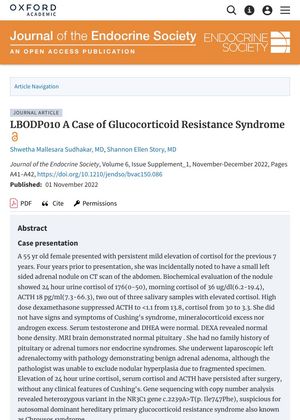A Case of Glucocorticoid Resistance Syndrome
November 2022
in “
Journal of the Endocrine Society
”
glucocorticoid resistance syndrome Cushing's syndrome mineralocorticoid excess androgen excess NR3C1 gene Chrousos syndrome glucocorticoids mineralocorticoid activity androgenic activity hypertension hypokalemic alkalosis male pattern hair loss dexamethasone ACTH Cushing's male pattern baldness androgens

TLDR The patient likely has Chrousos syndrome, a rare condition causing insensitivity to glucocorticoids, requiring high-dose dexamethasone treatment.
A 55-year-old female with a 7-year history of mildly elevated cortisol levels was studied. Despite having an adrenal nodule and persistently high cortisol and ACTH levels, she showed no signs of Cushing's syndrome, mineralocorticoid excess, or androgen excess. Post-surgery, her elevated cortisol and ACTH levels persisted. Genetic testing revealed a heterozygous variant in the NR3C1 gene, indicating a possible case of Chrousos syndrome, a rare condition characterized by end organ insensitivity to glucocorticoids. This condition can lead to increased mineralocorticoid and/or androgenic activity, potentially causing hypertension, hypokalemic alkalosis, and male pattern hair loss. Treatment involves high doses of dexamethasone to suppress excess ACTH and decrease mineralocorticoid and androgen effects. Recognizing this condition can prevent unnecessary adrenal surgery and guide appropriate treatment and long-term follow-up.




